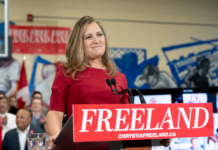Canadians are paying new highs on rental units for six consecutive months, with the average asking price being $2,178 per month in October. The upward trend has seen a 9.9% year-over-year increase.
While the annual rate of rent growth went down in October from the 11.1% jump in September, it was still the second fastest annual increase in 2023.
The data was published using the latest rental price report from Rentals.ca, using an analysis of monthly listings.
“I get asked all the time, ‘How are people affording this?’ The answer is they’re not,” said Giacomo Ladas, a Rentals.ca spokesman.
“Rents are getting so high to the point where people are almost out of options. They’re looking desperately to find more affordable rents.”
Average rents increased 1.4% in October, a slight dip from the September increase of 1.5% and 1.8% in August, which was in part due to seasonal factors.
Last month, the average price of rent for a one-bedroom unit was $1,906, up 14% from the same time in 2022, and the average cost for a two-bedroom was $2,255, an increase of 11.8% annually, reads the report.
Predictably, Vancouver held the record for the most expensive city in Canada for renters, with the average cost of a one-bedroom unit being listed for $2,872 and a two-bedroom listed at $3,777.
Both of which had dropped down from September’s asking prices, but were still up on an annual basis of 6.7% and 5.5% respectively.
Toronto was not far behind with $2,607 being the average rent for a one-bedroom and $3,424 for a two-bedroom.
According to the report, Canada’s rent inflation is being driven by rental increases in Alberta, Quebec and Nova Scotia, which is tied to a surge in population growth in tandem with new rentals being priced at above-average market cost.
In terms of annual rent growth for apartments, Calgary held the highest growth of any Canadian city for the ninth consecutive month.
Calgary rents for condominium and purpose-built apartments increased 14.7% year-over-year for an average asking price of $2,093.
“We can tell that because there’s so much interprovincial migration going on that people are leaving areas like Ontario and B.C. and they’re searching for more affordable rents, and they’re going to places like Calgary,” said Ladas.
Montreal had the second highest annual rent growth of 10.2%, giving the city an average asking price of $2,046 in October.
Another major factor in rent increases is the downward trend of people attempting to become homeowners. This is due to extremely high interest rates, noted Ladas.
“People are not moving out and going into the home ownership market because they can’t with these rates,” said Ladas.
The rate of households that rent is growing twice as fast as that of homeowners, with renters now making up one-third of total Canadian households.





















